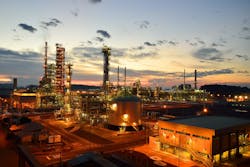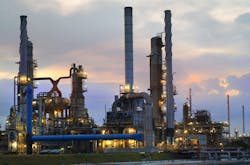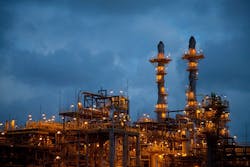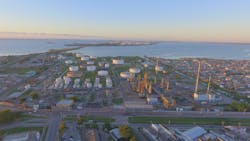Petrobras positioning refining business for sustainable future
Petróleo Brasileiro SA (Petrobras) as part of the company’s 2023-27 strategic plan expanded its program to modernize refining assets not included in its ongoing downstream divestment portfolio. The move was taken to ensure long-term competitiveness and sustainability of the business in a global market transitioning to a low-carbon future.
Known as RefTOP, the multiyear modernization program consists of initiatives designed to improve efficiency and operational performance of the refineries, including works to optimize processing capabilities and quality of production at the sites. It also features projects in line with the operator’s commitment to decarbonize corporate-wide operations by 2050.
In addition to presenting an overview of current and future works included within the RefTOP framework and general refining investment plan, this article discusses Petrobras’s proposed expansion of renewable diesel and sustainable aviation fuel (SAF) production.
RefTOP
Aimed at positioning itself more competitively within Brazil’s plan to open its national refining sector to outside investors, Petrobras launched RefTOP in May 2021 at a proposed budget of about $300 million as part of its 2021-25 strategic plan. The program covers modernization and upgrading works at the five refineries the operator will retain following completion of its downstream selloff, including:
- 434,000-b/d Refinaria de Paulínia (REPLAN) refinery in Paulínia, São Paulo, Brazil’s largest refinery.
- 170,000-b/d Refinaria Presidente Bernardes (RPBC) refinery in Cubatão, São Paulo.
- 239,000-b/d Duque de Caxias (REDUC) refinery in the Baixada Fluminense area of Brazil’s Rio de Janeiro state.
- 57,000-b/d Refinaria de Capuava (RECAP) in Mauá, São Paulo.
- 252,000-b/d Refinaria Henrique Lage (REVAP) refinery in São José dos Campos, São Paulo.
Alongside initiatives to increase the refineries’ energy performance by enabling better reuse of inputs such as natural gas, electricity, and steam generated by their own operations, the RefTOP program also promotes intensive use of digital technologies, automation, and robotization throughout the refining complex, including expanding existing use of digital twins.
Another important driver of the program involves increasing production of high value-added products such as diesel and propylene, the latter of which will serve as feedstock for Brazil’s petrochemical industry to help meet rising demand for plastics. RefTOP also includes works to help the refineries leverage processing of Brazil’s own low-sulfur presalt crudes, allowing the sites to achieve competitive advantages and opportunities for increasing margins by favoring production of low-sulfur S-10 diesel (10 ppm sulfur) and bunker fuel.
Upon approval of official investments under its latest strategic plan revealed in late-November 2022, Petrobras has now more than doubled its budget for RefTOP works to $813 million, which is included in the $7.8 billion of capital investments planned for its refining system through 2027.
In addition to REPLAN, RPBC, REDUC, RECAP, and REVAP’s inclusion in RefTOP, Petrobras also continues to own, operate, and invest in improvement works at its:
- 88,000-b/d Refinaria Abreu e Lima (RNEST) refinery in Ipojuca, Pernambuco, in northeast Brazil.
- 208,000-b/d Presidente Getúlio Vargas refinery (REPAR) in Araucária, Paraná.
- 157,000-b/d Refinaria Gabriel Passos (REGAP) refinery—including a set of pipelines of more than 720 km—in Betim, Minas Gerais.
- 201,000-b/d Refinaria Alberto Pasqualini (REFAP) refinery in Canoas, Rio Grande do Sul, in southern Brazil.
Petrobras says investments under the RefTOP and general refinery improvement spending plans are yielding favorable outcomes. By end-September 2023, RefTOP investments at REPLAN had resulted in the refinery reaching its highest utilization rate on record, with the site processing an average 427,000 b/d of crude oil—or 12.8 million bbl total—for a monthly total utilization factor (FUT) of 98.4% (Fig. 1).
In mid-October 2023, Petrobras said REPLAN’s record-high September FUT came alongside ongoing investments in the entirety of the company’s other remaining refining assets that—including REPLAN—reached a monthly FUT of 97%. Improved performance of the refining units amid these same investments during August-September increased the nine refineries’ combined FUT for third-quarter 2023 to 95.8%, the highest system-wide FUT since 2014.
Ongoing, future RefTOP works
Investments under Petrobras’ 2023-27 spending plan for RefTOP moving forward include 148 works aligned with its objectives of increasing operational availability, lowering energy intensity, reducing emissions, and increasing presalt crude processing capacity of its REPLAN, RPBC, REDUC, RECAP, and REVAP refineries, the company said.
Specific goals by 2025 involve:
- Achieving operational availability of more than 97%.
- Reaching an emissions intensity of less than 36 kg CO2e/CWT.
- Attaining an energy intensity index (by producing more and consuming less) of less than 89.
- Achieving 100% processing capacity of presalt crude produced from offshore Brazilian fields.
The kg CO2e/CWT indicator uses the Complexity Weighted Tonne (CWT) methodology developed by Solomon Associates and the Association of European Oil and Gas Refining and Distribution Companies specifically for the European oil refining industry, and adopted by the European Union Emissions Trading System, to set the sector’s greenhouse gas (GHG) reduction targets. The CWT of a refinery considers a load equivalent to distillation in terms of potential GHG emissions, given the different process units and respective loads processed in a refinery, making it possible to compare emissions from refineries of various sizes and complexities.
Projects are already under construction to expand and improve production quality of low-sulfur S-10 diesel. At REPLAN, installation of a new hydrotreater that will produce 63,000 b/d of S-10 diesel is due in second-half 2025. At REDUC, revamp of a hydrotreater adding 28,000 b/d of production is scheduled for startup before end-2023 (Fig. 2). Procurement is also under way for a hydrotreater at REVAP that will increase production by 41,000 b/d during second-half 2025.
A separate project at REPLAN currently under technical and economic feasibility studies involves a potential revamp of the refinery’s existing coker to achieve a 10,000-b/d expansion of processing capacity at the unit during second-half 2027.
Additional refining investments
Petrobras is also moving forward with the proposed completion and expansion of a second processing train at its original nameplate-capacity 130,000-b/d RNEST refinery (Fig. 3).
Approved in late-June 2023 following reassessment and confirmation of its economic attractiveness, the project involves resuming implementation of the previously stalled RNEST Train 2, work on which was interrupted in 2015.
Petrobras said revival of the RNEST Train 2 project—which is scheduled to begin operating in 2027 to reach full capacity in first-quarter 2028—will contribute to increased production of finished petroleum products to meet market demand, especially for S-10 diesel.
RNEST’s Train 2 has the potential to double the refinery’s capacity to 260,000 b/d.
Confirmation of the project follows Petrobras’s April 2023 launch of works to improve operations of existing RNEST Train 1’s atmospheric distillation unit, delayed coker, and other unidentified auxiliary units that, together, will return Train 1’s total crude oil processing capacity to 130,000 b/d. Scheduled for completion during fourth-quarter 2024, Train 1’s proposed modernization also will enable Petrobras to increase its supply of 100% low-sulfur S-10 diesel for the Brazilian market beginning in 2025.
In addition to reducing emissions of particulate matter, S-10 diesel—which has a higher cetane number than S-500 diesel (500 ppm sulfur)—promotes improved fuel performance of vehicle engines in line with Brazil’s stricter air pollution control program for on-road heavy-duty and utility vehicles.
BioRefino program
In addition to ongoing optimization of its conventional refining assets, Petrobras has dedicated $600 million to its BioRefino program, which aims to expand the operator’s production of SAF and renewable diesel at new and existing plants.
At its RPBC refinery, Petrobras has undertaken technical and economic feasibility studies for construction of a grassroots, dedicated biorefining plant that would be equipped to flexibly process 790,000 tonnes/year (tpy) of various renewable feedstocks to produce 6,000 b/d each of SAF and renewable diesel, as well as 3,000 b/d of other unidentified renewable products. If approved, the proposed 15,000-b/d biorefining plant would come online in 2027 and reach full-production capacity during first-half 2028, Petrobras said.
The planned RPBC project comes alongside Petrobras’s goal of expanding its production of renewable fuels via co-processing of renewable feedstock with conventional crude. The REPAR refinery currently produces 32,000 b/d of diesel with 5% renewable content through co-processing, with potential to reach up to 10%, the operator said.
Across its integrated downstream operations, Petrobras said it plans to expand production of renewable diesel to more than 154,000 b/d by 2027 by expanding co-processing capabilities at the REPAR, PRBC, REDUC, and REPLAN refineries.
In September 2023, Petrobras also entered an agreement with Abu Dhabi-based Mubadala Investment Co. (MIC) subsidiary Mubadala Capital (MC) to explore potential investment in a biorefinery project under development at MIC-owned Refinaria de Mataripe SA’s (REFMAT) 300,000-b/d refinery in the Recôncavo Baiano region of Bahia, Brazil. As part of the potential partnership, the companies have agreed to develop studies covering future business in the downstream segment, including evaluating Petrobras’ participation in an integrated biorefining project at REFMAT that would produce renewable diesel and SAF from macaúba palm, a native Brazilian crop.
Aligned with elements of Petrobras’ currently evolving 2024-28 strategic plan aimed at preparing for a more sustainable future, potential investment opportunities in the proposed biorefining project would help further diversify the company’s portfolio in a way that supports the corporate 2050 net zero goal, said Jean Paul Prates, Petrobras’s chief executive officer.
While neither Petrobras nor MC have disclosed further details of the proposed development plan, MC confirmed the plan follows an agreement signed in April 2023 between the state of Bahia and Acelen, a company MC created expressly to operate the Matripe refinery after acquiring the site and related assets from Petrobras in late 2021.
Acelen estimated overall investment required to complete the planned Matripe biorefinery at about 12 billion Brazilian real (US$2.4 billion), with final investment decision on the biorefining project expected by yearend 2023.
In May 2023, Petrobras said it also has entered a deal with partners Ultrapar Participações SA and Braskem SA for a pilot project to test processing of petrochemical products and fuels from 100% renewable materials at jointly owned Refinaria de Petróleo Riograndense SA’s (RPR) 17,000-b/d refinery in Rio Grande, Rio Grande do Sul, Brazil (Fig. 4).
Scheduled for November 2023, the first pilot test will involve adapting RPR’s existing FCC with proprietary technology developed by Petrobras’s research and development center to process completely renewable feedstocks. A subsequent test slated for June 2024 will entail co-processing conventional crude with bio-based feedstock to produce propylene, gasoline, and diesel, all with renewable content from advanced raw materials produced from non-edible biomass.
If successful, the pilot program could result in conversion of RPR’s refinery into Brazil’s first biorefinery producing finished products from 100% renewable feedstock, the partners said.
About the Author
Robert Brelsford
Downstream Editor
Robert Brelsford joined Oil & Gas Journal in October 2013 as downstream technology editor after 8 years as a crude oil price and news reporter on spot crude transactions at the US Gulf Coast, West Coast, Canadian, and Latin American markets. He holds a BA (2000) in English from Rice University and an MS (2003) in education and social policy from Northwestern University.




